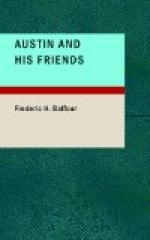“Auntie,” he said to her one day, “you’re just like a frog at the bottom of a well. You think the speck of blue you see above you is the entire sky, and the water you paddle up and down in is the ocean. Why can’t you take a rather more cosmic view of things?”
This extraordinary remark occurred in the course of a wrangle between the two, because Austin insisted on his pet cat—a plump, white, matronly creature he had christened ‘Gioconda,’ because (so he said) she always smiled so sweetly—sitting up at the dinner-table and being fed with tit-bits off his own fork; and Aunt Charlotte objected to this proceeding on the ground that the proper place for cats was in the kitchen. Austin, on his side, averred that cats were in many ways much superior to human beings; that they had been worshipped as gods by the philosophical Egyptians because they were so scornful and mysterious; and that Gioconda herself was not only the divinest cat alive, but entitled to respect, if only as an embodiment and representative of cat-hood in the abstract, which was a most important element in the economy of the universe. It was when Aunt Charlotte stigmatised these philosophical reflections as a pack of impertinent twaddle that Austin had had the audacity to say that she was like a frog.
And now her eaglet had been maimed for life, and whatever he might feel about it himself her own responsibilities were certainly much increased. At this very moment, for instance, after having practised stumping about the room for half-an-hour he insisted on going downstairs. Of course the idea was ridiculous. Even the doctor shook his head, while old Martha, who had tubbed Austin when he was two years old, joined in the general protest.




